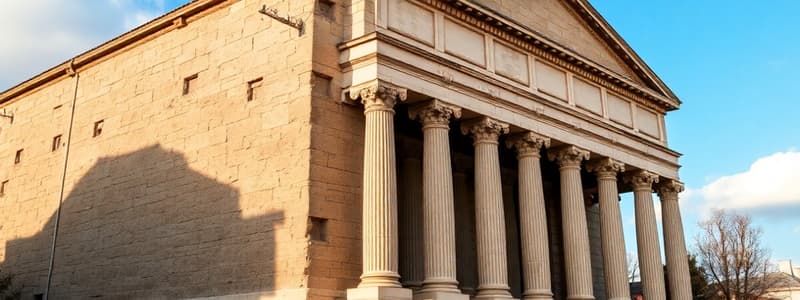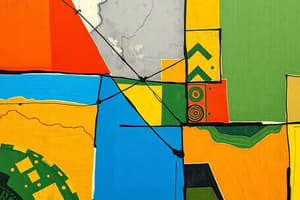Podcast
Questions and Answers
Which event significantly contributed to the spread of Greek learning to Italy during the Renaissance?
Which event significantly contributed to the spread of Greek learning to Italy during the Renaissance?
Humanism during the Renaissance focused solely on religious affairs.
Humanism during the Renaissance focused solely on religious affairs.
False (B)
What is the essence of Humanism as understood during the Renaissance?
What is the essence of Humanism as understood during the Renaissance?
Truth based on logic and reason.
The Renaissance marked the transition from the medieval age to the _____ age in Europe.
The Renaissance marked the transition from the medieval age to the _____ age in Europe.
Signup and view all the answers
Match the Renaissance developments with their respective fields:
Match the Renaissance developments with their respective fields:
Signup and view all the answers
Which of the following was NOT a factor contributing to the Renaissance?
Which of the following was NOT a factor contributing to the Renaissance?
Signup and view all the answers
The spirit of inquiry during the Renaissance encouraged individuals to accept truths based solely on authority.
The spirit of inquiry during the Renaissance encouraged individuals to accept truths based solely on authority.
Signup and view all the answers
Renaissance thinkers and scholars were largely supported by wealthy ____ and rulers.
Renaissance thinkers and scholars were largely supported by wealthy ____ and rulers.
Signup and view all the answers
What was one of the main impacts of the Renaissance on the modern world?
What was one of the main impacts of the Renaissance on the modern world?
Signup and view all the answers
Fundamental civil liberties include the right to free speech and the right to a fair trial.
Fundamental civil liberties include the right to free speech and the right to a fair trial.
Signup and view all the answers
What is the primary purpose of democratic institutions?
What is the primary purpose of democratic institutions?
Signup and view all the answers
The shift from an agricultural society to one where factories and machines produce goods is known as __________.
The shift from an agricultural society to one where factories and machines produce goods is known as __________.
Signup and view all the answers
Match the following concepts with their definitions:
Match the following concepts with their definitions:
Signup and view all the answers
Which of the following was a characteristic feature of the modern age?
Which of the following was a characteristic feature of the modern age?
Signup and view all the answers
Humanism focuses primarily on religious beliefs and doctrines.
Humanism focuses primarily on religious beliefs and doctrines.
Signup and view all the answers
What event marked the beginning of the modern age in India?
What event marked the beginning of the modern age in India?
Signup and view all the answers
What does the term 'Renaissance' imply?
What does the term 'Renaissance' imply?
Signup and view all the answers
The medieval world was characterized by a strong belief in scientific reasoning.
The medieval world was characterized by a strong belief in scientific reasoning.
Signup and view all the answers
What were some of the primary sources preserved from the modern period?
What were some of the primary sources preserved from the modern period?
Signup and view all the answers
The ____ period is often marked by the decline of feudalism and the rise of individual rights.
The ____ period is often marked by the decline of feudalism and the rise of individual rights.
Signup and view all the answers
Which of the following is NOT a characteristic of the Renaissance?
Which of the following is NOT a characteristic of the Renaissance?
Signup and view all the answers
Match the following concepts with their correct descriptions:
Match the following concepts with their correct descriptions:
Signup and view all the answers
By the 16th century, all of Europe had fully entered the modern age.
By the 16th century, all of Europe had fully entered the modern age.
Signup and view all the answers
In which century did Europe enter the modern age?
In which century did Europe enter the modern age?
Signup and view all the answers
Flashcards
Renaissance
Renaissance
A period of European history marking the transition from the medieval to the modern age, characterized by a revival of classical learning and a focus on human affairs.
Factors contributing to Renaissance
Factors contributing to Renaissance
Expansion of trade, voyages of discovery, interaction with other societies, and the fall of Constantinople.
Fall of Constantinople
Fall of Constantinople
The capture of Constantinople by the Ottoman Turks in 1453, which led to the migration of Greek scholars and their works to Italy.
Humanism
Humanism
Signup and view all the flashcards
Scientific temper
Scientific temper
Signup and view all the flashcards
Impact of Renaissance
Impact of Renaissance
Signup and view all the flashcards
Greek Scholars
Greek Scholars
Signup and view all the flashcards
Patronage
Patronage
Signup and view all the flashcards
Modern Age Start
Modern Age Start
Signup and view all the flashcards
Modern Age in India
Modern Age in India
Signup and view all the flashcards
British in India
British in India
Signup and view all the flashcards
Modern Age Characteristics
Modern Age Characteristics
Signup and view all the flashcards
Urbanization
Urbanization
Signup and view all the flashcards
Technological Advancements
Technological Advancements
Signup and view all the flashcards
Democratic Institutions
Democratic Institutions
Signup and view all the flashcards
Historical Periods
Historical Periods
Signup and view all the flashcards
Primary Sources
Primary Sources
Signup and view all the flashcards
Secondary Sources
Secondary Sources
Signup and view all the flashcards
Medieval World Beliefs
Medieval World Beliefs
Signup and view all the flashcards
Modern Period in Europe (15th Century)
Modern Period in Europe (15th Century)
Signup and view all the flashcards
Renaissance (1300-1600)
Renaissance (1300-1600)
Signup and view all the flashcards
Feudalism
Feudalism
Signup and view all the flashcards
Impact of British Rule on India
Impact of British Rule on India
Signup and view all the flashcards
Transition from Medieval to Modern
Transition from Medieval to Modern
Signup and view all the flashcards
Study Notes
Periodization of History
- History is divided into periods: Prehistoric, Ancient, Medieval, and Modern
- These periods are differentiated by four key characteristics: political, economic, cultural/religious, and social developments.
- Classification helps organize and understand historical events and changes.
A Period of Transition
- Historical events differ across countries based on their stage of development.
- The modern age started in the 15th century in Europe, and in the mid-18th century in India.
- India's transition from medieval to modern was marked by the British conquest.
- This conquest differed from earlier invasions as the British established alien rule for approximately 200 years, creating a significant divide with Indian society.
Characteristics of the Modern Age
- Urbanization: Growth of urban areas as people move from rural regions.
- Technological advancement: Development of new tools, machines, and systems that improve efficiency.
Source Materials for the Modern Age
- Primary sources include original documents, official records, literary works, historical texts, artistic works (paintings, sketches, etc.), photographs, audio/video recordings, newspapers, and archeological remains.
- Secondary sources are created by historians and scholars who analyze and interpret primary source materials, including books, reviews, reports, and articles.
The Medieval World
- Medieval societies were considerably superstitious, with widespread beliefs in witchcraft, the flatness of the earth, and the significance of birthmarks.
- Women were often perceived as witches and subject to brutal practices.
The Modern Period in Europe
- The 15th century marked the transition to the modern era in Europe.
- Feudalism declined, new towns emerged, trade increased, and individual rights gained strength.
- Despite these changes, much of Europe remained feudal until the 16th and parts of Eastern Europe into the 18th Century.
The Renaissance
- The Renaissance, a period between 1300-1600, was a momentous period of change and discovery in Europe, significantly influencing its shift to the modern era.
- This period, commonly described as a "rebirth," profoundly altered many aspects of people's lives and ways of thinking. Key factors contributing to the Renaissance include the voyages of discovery from Europe, trade expansion (e.g., Christopher Columbus' voyages), the capture of Constantinople, and the introduction of classical Greek and Roman knowledge.
The Impact of the Renaissance
- Renaissance scholars shifted focus from divine matters to human affairs, fostering a humanistic approach.
- This led to scientific inquiry, new developments in various fields (art, architecture, sculpture, literature, science, and technology).
- The era's Renaissance ideals profoundly shaped the modern world through technological advances, shifts in belief systems, challenges to existing authorities and the emergence of new artistic and literary works.
Voyages of Discovery
- The Ottoman takeover of Asia Minor disrupted traditional trade routes between Europe and Asia, compelling Europeans to find alternative sea routes to continue trade.
- These voyages of exploration, led by figures like Prince Henry the Navigator, Bartholomew Diaz, and Christopher Columbus, greatly expanded European knowledge of the world and led to colonization.
Important Discoveries
- Portuguese exploration, particularly through figures like Prince Henry the Navigator, substantially advanced European understanding of navigation and exploration.
- Explorers like Diaz and Gama charted crucial sea routes, opening trade routes to Asia.
- Columbus' voyage in 1492 inadvertently led to the discovery of the Americas.
- The 15th-century voyages considerably expanded knowledge of global geography and triggered a surge in European expansionism.
Studying That Suits You
Use AI to generate personalized quizzes and flashcards to suit your learning preferences.
Related Documents
Description
Explore the division of history into distinct periods: Prehistoric, Ancient, Medieval, and Modern. This quiz delves into the characteristics of each period, the impact of the British conquest in India, and the transitions that define the Modern Age. Test your understanding of key historical developments and classifications.




